China’s EV market has become increasingly competitive, with impacts on both the domestic economy and the global auto industry. The country’s automobile industry association has issued a warning about intense competition following a series of price cuts by EV manufacturers, particularly BYD earlier this month.
According to Cryptopolitan, BYD achieved its highest monthly sales in May, selling 382,476 vehicles after implementing price cuts of up to 34% in the last few days of the month, as stated in a company announcement on Sunday.
Of the total sales, 376,930 were passenger vehicles, with 204,369 being fully electric and 172,561 being plug-in hybrids. This marks only the second instance since early 2024 where electric vehicle sales have surpassed hybrids. BYD has set a full-year sales target of 5.5 million units, and by the end of May, it had already reached 1.76 million units sold.

On May 23, BYD initiated a major round of price reductions across its 22 advanced models, cutting prices by as much as 53,000 yuan (around 7,300 USD), representing the company’s third price-cut campaign since late March, reinforcing its efforts to clear inventory and sustain market position.
BYD’s substantial price cuts in May not only drew a surge of customers into dealerships but also caused a sharp decline in its stock price, along with other EV shares. Automakers that had not yet lowered prices found themselves compelled to follow suit, fueling industry-wide tensions. As a reaction, the China Association of Automobile Manufacturers (CAAM) issued a warning on Saturday, cautioning that the ‘disorderly price wars’ escalate aggressive competition and squeeze corporate profit margins.

The price cuts reverberated across the auto industry, prompting swift reactions from major manufacturers such as Geely, Chery, and SAIC-GM. In response, these companies rolled out temporary discounts and trade-in incentives to stay competitive. Meanwhile, the China Association of Automobile Manufacturers called on automakers to uphold fair competition, avoid monopolistic behavior, and refrain from undercutting prices to ensure industry stability and protect consumers.
BYD’s disappointing sales in May did little to stabilize its declining stock price, which has dropped nearly 20% on the Hong Kong Stock Exchange over the past 10 days, following a record high last week.
AUTO TECH | Audi Trials AI-Powered Picking Process at Böllinger Höfe Plant





